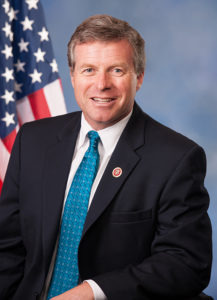
Courtesy of Charlie Dent’s website
The Brown and White conducted an interview with Republican congressman Charles Dent, ’93G, whose district covers the entire Lehigh Valley, including Lehigh University. Dent, who received his master’s degree in public administration from Lehigh, discussed his time at the university, as well as and the differences between state and national politics. He is currently up for re-election.
Q: You were born and raised in Allentown. Did that influence you to come to Lehigh?
A: My grandfather was class of 1906 at Lehigh. My father was class of ’52, my father-in-law was class of ’64, my brother was class of ’81, I had three uncles’ classes of ’37, ’39 and ’42, and my sister and I each have our master’s degrees from Lehigh. I was working at Lehigh University in the late ‘80s up until 1990. When I was at Lehigh, I then pursued my master’s degree in public administration at night.
Q: Looking into your political career, you were elected to the Pennsylvania state legislature in 1990, correct?
A: I was elected in 1990 to the Pennsylvania legislature, Pennsylvania house of representatives, that’s correct.
Q: What drove you to get into politics, especially the Pennsylvania legislature?
A: I always had an interest in public policy and politics. I studied foreign service and international politics at Penn State as my undergraduate degree. At Lehigh I earned my master’s in public administration or an MPA. So I always had a genuine interest in these types of things and public policy. I saw an opportunity to run for the state house in a pretty heavily Democratic district at the time. I worked my tail off, knocked on 20,000 doors and won.
Q: Did your experience at Lehigh help push you at all to try and run for this position?
A: Yeah, it did actually. I had a very good experience at Lehigh, working there. One thing we did, Lehigh had a fair amount of interaction with the state government, you know the Ben Franklin partnership and manufacturers resources center were established at Lehigh, and those were really state-funded entities designed to facilitate interaction between industry, higher education and state government. One focused on more traditional manufacturers, the other one focused on more startup companies and more advanced technology operations. So I felt that there was a positive interaction where the state government was actually there to try to help people, usually when somebody is calling from the government people are usually nervous. So that kind of helped inspire my interest in state government with what was Lehigh’s interaction at the time.
Q: You spent 14 years as part of the Pennsylvania legislature. Can you tell me a little bit about that experience and when you look back at it, what stands out the most?
A: I was eight years in the state house and six years in the state Senate. When I was a legislator, I worked on a number of issues, from housing issues to economic development to you name it. I very much enjoyed that experience, being able to help shape policy, working closely with Governor Tom Ridge at the time. We did a lot of good things, a lot of important anti-crime measures we tasked, good economic development proposals to help make the state a better place to do business. We also adjusted the tax code, lowered some of our taxes that were extremely high, particularly on the business side, also reformed the workers compensation system among other things. So I was involved in a lot of interesting issues.
Q: You won your position in a heavily Democratic district, what are some of the challenges you faced winning the district as a Republican?
A: It was the city of Allentown. The district is even more Democratic now then when I was first elected. The challenge for running for a seat like that was that you can’t simply run as a partisan Republican. Running as a partisan Republican, or I should say a partisan ideological Republican, wouldn’t sell well in a district where there are more Democrats than Republicans, and it was an urban district too. So you have to be a little bit more pragmatic and more focused on solving problems than trying to win ideological arguments.
Q: What made you decide to run for Congress and what are the main differences between the two?
A: Well, again, I saw there was an opportunity to run for Congress. 9/11 had happened just a couple of years prior to my deciding to run, and that certainly motivated me to engage at the federal level, but also I was always interested in federal issues. I was really excited about the opportunity to serve on the federal level. The difference between the state government and the federal government is that the state government deals with a lot of important issues, but they are more focused on issues like education, human services, transportation and the state business environment. Federal level, you are dealing with every issue under the sun. Of course you are dealing with education and human services, but much more broadly you are dealing with national security policy, tax policy, obviously health care in a very big way. I am on the appropriations committee, you tend to spend a lot more time on macroeconomic issues. So we deal with these big issues, we had to deal with issues from the Iraq War, the Afghanistan War to the financial crisis to the health care law, Obamacare, for our current situation today. Now I spend my time as chairman of the appropriations subcommittee military construction and the Department of Veterans Affairs. I spend a lot of time working with the VA trying to resolve some of these very serious problems we have there. Also, of course, dealing with the defense department and dealing with our military construction projects all over the world, in this country and all over the world. I am very engaged in that as well as all of these issues that really affect our veterans, you know, wait times, access to care, GI bills, pension and other benefit matters that we deal with for veterans.
Q: You also serve on the house ethics committee, what are your duties for that?
A: I am chairman of the house ethics committee, so I spend my time there too. Think of that as internal affairs for the police department. My job is to make sure that members comply with house rules and maintain standards. It affects members of the house and staff members of the house, so only members and staff. We don’t deal with criminal matters. We deal with, again, house rules and standards. I spend my time trying to help members comply with house rules and when we must, we have to conduct investigations and at times sanctions members for violations of those rules or standards.
Q: Throughout your time in Congress, what have been some of the biggest issues you have worked on and what are you most proud of?
A: I mean I have worked on so many issues over the years. I guess what I pride myself on is not any particular piece of legislation, although I can say we passed a synthetic drug bill, synthetic drug law a few years ago — my bill — I was proud of that. I’m proud of a number of things I have gotten signed into law, the recent military construction VA appropriations bill. There are a number of things I could be proud of legislatively that were exclusively my bills, but what also is important to me is that I kind of view myself as one of the people who’s called upon to try to help resolve conflict within the Congress. There are certain things we need to get done, fund the government or prevent the country from defaulting on its obligations, we need members of Congress who have the capacity to work across the aisle to actually advance necessary legislation. I am usually the guy who is brought into the middle of those situations and I’m there to help break the logjam or move the ball down the field so to speak. So that’s one role I play as a person who is seen as a pragmatic leader who can find solutions to some of these very vexing challenges we face. There are a number of things that we need to do, and I am usually the guy who is involved to make sure we get those fundamental tasks accomplished.
(Dent said the recent military construction VA appropriations bill is the first appropriations bill passed on time since 2009, a distinction he said he’s proud of.)
Q: What does it mean to you to serve as the congressman for your hometown and Lehigh University?
A: I have Allentown, Bethlehem, all of Lehigh County, over half the population of Northampton County including Lehigh University. I am very proud to represent the district of my family. We have been here for many generations, that is a source of great pride for me. The community I know is the community I love and the one I serve. My district also extends out to south central Pennsylvania, Hershey area, Lebanon County — it’s very compatible with the rest of the district. So I am very pleased to have these additional areas as well, but it is really great to be representing a community you really know like the back of your hand. It makes my job a lot easier, there are a number of members of Congress who have kind of been transplanted into their districts or they have moved into represent more of a suburban district where they don’t have as much of a community identity. Here we do have a community identity, and I am proud to be part of that identity.
Q: What are your thoughts on the current presidential election?
A: Well, in a nation of over 300 million people, it’s sad this is the best we can do.
Q: Are you personally endorsing Mr. Trump?
A: No. I am not supporting Hillary Clinton under any circumstances, and I have said that I am not endorsing or supporting the Republican nominee ether.
Editor’s note: This interview has been edited for length and clarity.





Comment policy
Comments posted to The Brown and White website are reviewed by a moderator before being approved. Incendiary speech or harassing language, including comments targeted at individuals, may be deemed unacceptable and not published. Spam and other soliciting will also be declined.
The Brown and White also reserves the right to not publish entirely anonymous comments.